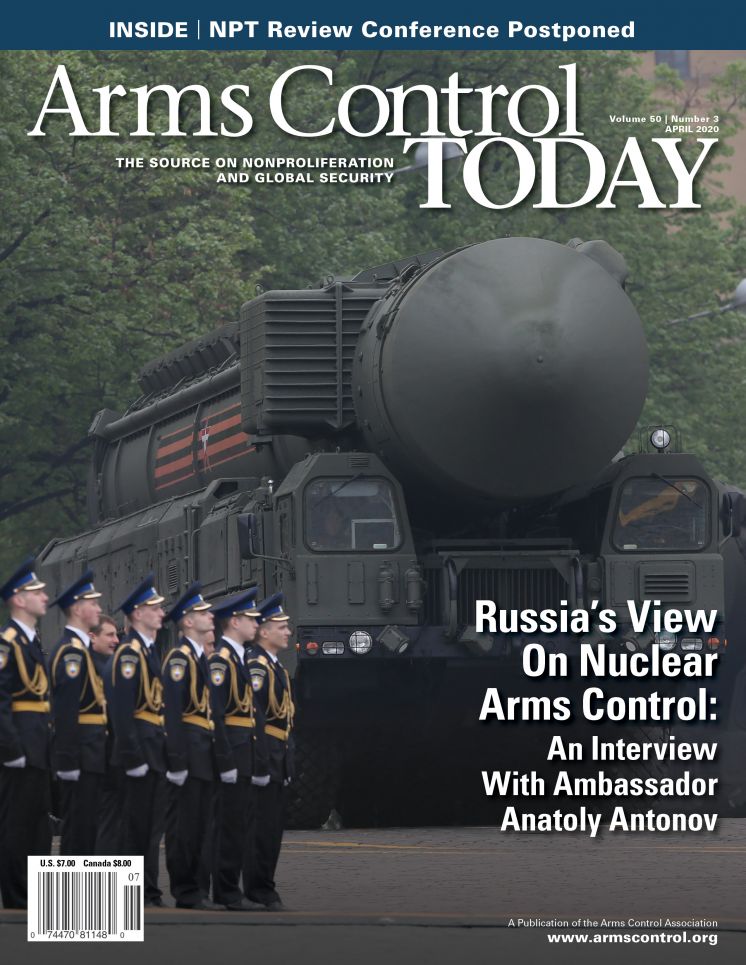Arms Control Today, News in Brief, April 2020
The publication of the News in Brief section of Arms Control Today magazine is a joint project of the Center for International Security and Policy and The Arms Control Association.
Firearms Export Changes Partially Blocked
Despite opposition from some members of Congress and a wide range of civil society groups, Trump administration changes to its oversight of certain firearms exports took effect in March. A federal district judge, however, issued a temporary injunction on portions of the rules that deal with 3D gun-printing plans.
The rules came into effect on Mar. 9, despite congressional efforts such as those of Sen. Bob Menendez (D-N.J.), ranking member on the Senate Foreign Relations Committee, who had twice sought holds on the new rules in 2019. The new system transfers overall authority for the export of certain types of semiautomatic and other firearms and their ammunition to the Commerce Department from the State Department. (See ACT, March 2020.) Renewing a letter delivered in May 2019 from more than 100 civil society organizations, 23 groups sent a message to Congress on March 4 encouraging them to stop or reverse the changes, arguing that the new rules “will thwart congressional oversight and exacerbate gun violence, human rights abuses, and armed conflict around the world.”
On March 6, Judge Richard Jones in the U.S. District Court for the Western District of Washington ordered a preliminary injunction in a case filed by more than 20 state attorneys general that sought to block all the changes. Jones limited the injunction to prohibit changes to how online 3D printing plans for firearms, sometimes called “ghost guns,” are regulated.
Some of the attorneys general criticized the president’s efforts. “If the Trump administration has its way, these ghost guns will be available to anyone regardless of age, mental health or criminal history…. We will keep fighting back against this unlawful, dangerous policy,” said Washington State Attorney General Bob Ferguson on March 9. – JEFF ABRAMSON
Court Ends Final Bid to Save MOX Program
A U.S. federal court dealt the final blow Feb. 20 to a troubled project at the Savannah River Site in South Carolina that would have converted surplus plutonium from the U.S. nuclear weapons program into mixed-oxide (MOX) fuel for nuclear power plants.
Judge J. Michelle Childs of the U.S. District Court in South Carolina formally terminated a lawsuit brought by the state in 2018 after the National Nuclear Security Administration (NNSA) announced it would end construction of the Mixed Oxide Fuel Fabrication Plant at the site.
Construction on the plant began in 2007 to implement a U.S.-Russian agreement for each nation to dispose of 34 metric tons of plutonium deemed unneeded by their nuclear weapons programs. Following years of cost overruns and scheduling delays, the Obama administration decided to end the project’s funding in 2016, sparking a backlash from lawmakers in South Carolina. Russia withdrew from the agreement later that year, citing U.S. noncompliance.
After U.S. Energy Secretary Rick Perry signaled in May 2018 that the department would scrap the project in favor of a less expensive alternative, South Carolina sued to prevent the site’s shutdown, winning a brief injunction. (See ACT, June 2018.) A federal appeals court later ruled in the department’s favor, and the Supreme Court declined to hear South Carolina’s appeal of that decision, leading Childs to put a end to the suit.
The Energy Department is now planning to adapt the MOX fuel facility to join Los Alamos National Laboratory in the annual production of at least 80 plutonium pits, the cores of nuclear weapons, by 2030. The department aims for the planned Savannah River Plutonium Processing Facility to produce at least 50 plutonium cores per year by 2030. – PERI MEYERS
Wassenaar Nations Set New Export Controls
Transfers of military-grade software and chip manufacturing technology will face increased scrutiny following an amendment to the Wassenaar Arrangement, an international export control regime.
Established in 1996 and now numbering 42 nations that apply the voluntary trade restrictions, the Wassenaar Arrangement restricts the export of certain conventional weapons, dual-use goods and other technology. Its members include France, Germany, India, Japan, Russia, South Korea, and the United States. Notable nations not participating include China, Iran, Israel, and North Korea.
At their 25th annual plenary meeting in December in Vienna, members agreed unanimously to adopt new export controls in such areas as cyberwarfare software, communications monitoring, digital investigative tools and forensic systems, suborbital aerospace vehicles, technology for the production of substrates for high-end integrated circuits, hybrid machine tools, and lithography equipment and technology.
In addition, the nations clarified existing export control measures regarding ballistic protection, optical sensors, ball bearings, and inorganic fibrous and filamentary materials. They also relaxed some controls, including those with respect to certain laminates and commercial components with embedded cryptography.
The enhanced export restrictions might affect sales by forensic cybersecurity and chip manufacturing companies, according to articles from Kyodo News and Haaretz. – PERI MEYERS

